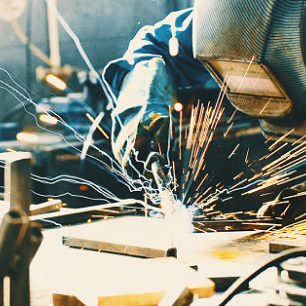Jump to:
Unethical Decisions and Their Consequences
Quality and integrity are crucial for any industry but are especially important in nondestructive examination (NDE). For years, I have told people about the importance of NDE and how our decisions affect people’s lives. I often tell students and inspectors, “When we do our jobs right, people live. When we do our jobs wrong, people die.”
Deciding if a part or a weld is acceptable or rejectable is only one aspect of the importance of this industry. The ethics behind our decisions are equally important, if not more important. This is a very small industry, and one’s word and integrity are all they have. Once someone is labeled unethical, they will likely have difficulty finding work in this industry.
Handling Customers and Standards
Inspectors must always stay true to themselves and the inspection at hand. Unfortunately, it is not uncommon for inspectors to find themselves in a so-called trap, where the customer or production team wants a part or weld to pass inspection and wants it now. If customers or production had their way, parts or welds would likely not even be inspected. I have told people for years, “It is production’s job to get the part done, and it is our job to make sure the part is done right.” Because of this, I have seen some inspectors decide to skip the inspection and simply accept a part or weld. I even argued with inspectors for accepting parts because they felt that the in-service stresses were very low and the part was built very strongly. Therefore, what is the point in even inspecting the part?
Indeed, parts and welds are often built to withstand a higher stress than the intended service, but determining that is not our job as inspectors. As inspectors, we are getting paid to inspect a part or weld regardless of the intended service and design strength. I remember setting up to inspect welded tubes and another inspector telling me, “Don’t bother inspecting those parts; those parts are always good.” At that moment, I realized those parts were always good because this inspector had probably never inspected one — a scary notion. These tubes were inspected before and after heat treatment, and when I got a batch to inspect after postweld heat treatment, one weld was only tacked. When I looked to see who had inspected them before heat treatment, it was none other than the inspector who’d told me that the parts were always good. That inspector never did inspect any of them. After I rejected the tube, it had to go back to welding, inspection, heat treatment, and back to inspection. Talk about a massive waste of time and energy, just because an inspector decided not to do the job they were getting paid for. My concern was, what if that inspector inspected it the second time, meaning that they just stamped it off, and it went into service? This was a critical aircraft part; if it had failed in service due to a missing weld, it could have brought down the aircraft.
The most egregious ethics violation I have seen in this industry is people accepting parts without inspecting them, as in the example above. I have also seen documents forged, such as classroom training certificates, experience records, certification records, and even the American Society for Nondestructive Testing (ASNT) certificates. Years ago, I was asked how to ban an inspector from the industry over the ethics violations the inspector committed, ultimately leading to the company’s closure. I told the person that I wish there were a process for it. When I served on the board of directors for ASNT, banning inspectors from the industry was a discussion we also had.
Stamp Importance
In aerospace, it is common for inspectors to use a stamp as opposed to physically signing the paperwork that accompanies the parts. I often encounter inspectors who do not understand that the stamp is their signature. Inspectors usually think, “It’s just a stamp,” and do not realize its importance. They do not understand that everything they stamp, sign, or fill out becomes a legal document and can be called into evidence in a court of law if something happens and the company gets sued. Inspectors are not likely to get sued themselves, but that does not mean they will not end up on the stand in front of a judge, jury, and a grieving family, defending what they did. Most Certified Welding Inspectors (CWIs) understand the importance of their stamp, but I have still seen some who do not.
Another factor that has occurred is somebody using somebody else’s stamp. When people do this, they are not only committing fraud by using somebody else’s stamp; they are also committing identity theft because when they stamp the paperwork, they are stamping it as another person. One NDE manager told me of a time they noticed a specific inspector’s stamp on some paperwork for parts currently being processed through the plant. The issue was that the inspector was on vacation at the same time the stamp was being used. When the manager investigated it, they discovered that the inspector gave their stamp to a trainee (an uncertified individual) and told them to stamp the paperwork while the inspector was on vacation.
Code of Ethics and Integrity
Early in my career as a field radiographer, I worked for many CWIs. When I achieved CWI status, I also had multiple ASNT Level IIIs. When I started applying for CWI jobs, I was repeatedly turned down, and the most common reason was that companies did not want a CWI who was also an ASNT Level III because as an ASNT Level III, we must sign a code of ethics, which makes us “too ethical.” Many companies do not realize that CWIs also sign a code of ethics. However, I understood what those companies meant because when I worked for those CWIs, I saw many of them accept parts or welds that they knew should have been rejected or reinspected. Granted, this was over 30 years ago, but at the time, there was a negative stigma associated with CWIs in that several of them had performed jobs unethically. What makes it worse is the customer wanted a CWI that was somewhat unethical as opposed to someone who was “too ethical.” To me, this is a very scary thought. We must always act with integrity and ethics. It seems to me that people often forget the importance of what we do. Just because an inspector has never heard of one of their parts/welds failing in service does not mean it has never happened.
On the other hand, some inspectors have seen their parts stressed beyond the limit and the parts have held. I remember watching a pipe assembly I inspected in a refinery being lifted incorrectly by one crane instead of two. When the crane operator set the pipe down, he had a 120-ft-tall “U” instead of a straight run. All I could think of the whole time was, “At least my weld held.”
When applying to become a CWI, the applicant must sign and agree to follow a code of ethics. This is a common practice for any organization that issues certifications. As mentioned earlier, ASNT has its code of ethics for the certifications it issues, and the American Petroleum Institute has its code of conduct. The International Code Council (ICC) also has a code of ethics for each individual participating in any ICC activity. A lot of societies even have a code of ethics, or code of conduct, for the members of the society, and violating that code could lead to that individual losing their membership and the benefits of being a member.
In Closing
Overall, there is not enough education on the topic of ethics. Due to this, some aerospace primes, such as Rolls-Royce, have mandated that any company that engages with them must have an ethics policy that all personnel involved in NDE must sign and agree to. This is an excellent way of enforcing ethics; every inspection company should do it with all of its employees. This industry is so important, and I am still amazed when people make unethical decisions. Inspectors need to be true to themselves and be true to the inspection. The most essential thing in this industry is remembering what we do. “When we do our jobs right, people live. When we do our jobs wrong, people die.”
MICHAEL V. MCGLOIN (ndtenterprises@msn.com) owns NDT Enterprises LLC (NDT Level III Consulting Services), Huntington Beach, Calif. He is an AWS CWI, ASNT Level III, ACCP Level III, ASNT past president (2019–2020), and ASNT chair of the board (2020–2022).


